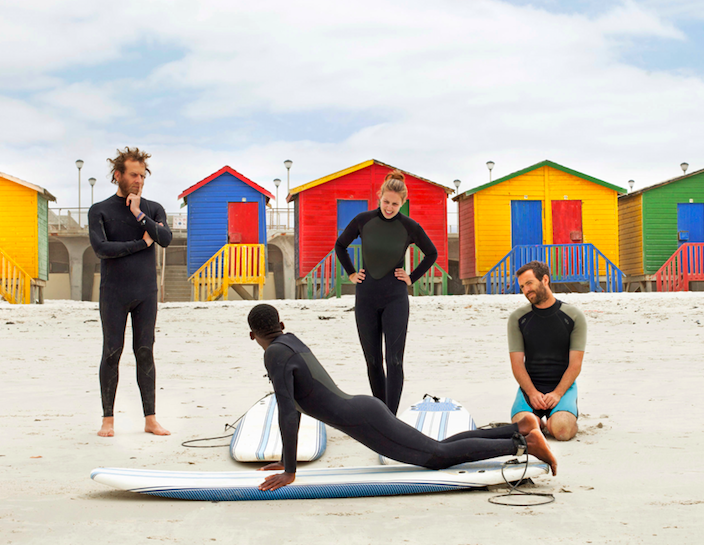
Travelers participate in a “Surf With Purpose” Social Impact Experience in Cape Town. Each lesson provides one month of surf therapy for a local child.
$169.7 billion. That’s how much the global vacation rental market is expected to be worth this year, up from $100 billion just three years ago (FutureStay). Fueled by major players like Airbnb, Booking.com, and Expedia (which owns HomeAway and VRBO), the industry has changed what travel looks like today. These vacation rental giants are now looking to corporate social responsibility (CSR) – specifically, social impact – to better the communities surrounding their properties.
A new generation of travelers
Young adults have been a driving force behind the increase in vacation rentals. Seventy-four percent of travelers between the ages of 18 and 34 have used a vacation rental service, compared with 38 percent of Gen X and 20 percent of Baby Boomers (according to VRMintel). Experts predict vacation rentals will only grow in popularity as more of Gen Z grows old enough to plan their own travel.
“More than three quarters of these newly independently vacationing Gen Z’ers have already stayed in a vacation home, cabin or condo at some point in their lives, making them far likelier than their parents to consider vacation rentals a primary lodging option as they continue to mature,” said Melanie Fish, HomeAway travel expert, in a 2018 press release.
Those young travelers aren’t just booking their vacation accommodations online – they are constantly sharing their thoughts and experiences via social media. According to a 2017 Cone report on Gen Z and CSR: “This generation is a force to be reckoned with, using their digital devices to spread social and environmental messages far and wide. But they’re not going it alone – they expect companies to be their partners in change.”
It’s all about the experience
To create this social change desired by younger travelers, Airbnb launched Social Impact Experiences. These travel add-ons, booked through the Airbnb platform, allow guests to participate in a unique activity such as hiking L.A.’s Runyon Canyon with rescue dogs, or surfing in Capetown. Airbnb waives all its fees for these excursions, so 100 percent of the proceeds benefit the nonprofit organization hosting the activity. The aforementioned Experiences, for example, benefit Free Animal Doctor, which funds veterinarian bills for pets in need, and Waves for Change, a surf therapy program for youth affected by trauma and violence, respectively. According to Airbnb, some participating nonprofits have earned upwards of $50k a year from hosting these Social Impact Experiences.
Not only are the nonprofit groups earning much-needed funds from travelers booking these excursions, but they are also gaining visibility through guests posting about their experience on social media. The more “Instagrammable” the experience, the better. After all, who wouldn’t want to learn more after seeing someone’s post about a sea turtle rescue in Costa Rica or a street art tour of Rome?
Funding the future of responsible tourism
According to a 2018 study from Booking.com, almost half (47 percent) of travelers said they were inspired to select more sustainable travel options after “seeing the positive effect that sustainable tourism can have on the local people.”
To support innovations in responsible tourism, Booking.com has launched a series of programs, including the Booking Cares Fund, Labs and Booster. These provide startups, NGOs and other groups with education and financial assistance to make significant improvements in the social impact of travel. As the Booking Cares website states, “We champion sustainable tourism changemakers and support their work to strengthen local communities, to preserve and promote culture, to help disperse tourism more evenly and to protect our valuable natural resources.”
Airbnb has committed $1 million to expand community-led, socially responsible tourism in Africa. Projects include Airbnb Africa Academy and last fall’s Africa Travel Summit. During the Summit, Airbnb host Ntsiki Nconjana gave the following response when asked to complete the sentence “To me, healthy tourism in Africa means”:
“[To me, healthy tourism in Africa means] understanding the real meaning of hospitality, Ubuntu—I am because you are—embodies that.”
Image credit: Airbnb

Megan is a writer and editor interested in sharing stories of positive change and resilience. She is the author of Show Up and Bring Coffee, a book highlighting how to support friends who are parents of disabled children. You can follow her at JoyfulBraveAwesome.com.














